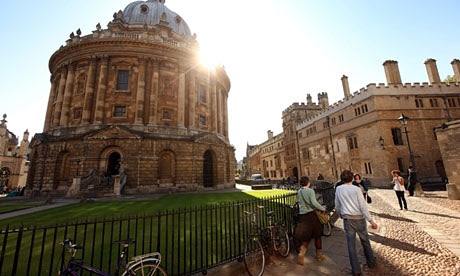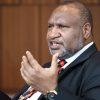
One of Britain’s elite universities defended its record on diversity on Sunday as the government said it should “shine a spotlight” on its admissions decisions for ethnic minority and disadvantaged students.
At the weekend, David Cameron accused the University of Oxford – where he studied as an undergraduate – of “not doing enough to attract talent from across our country”, and noted that Oxford accepted just 27 black British students in a single year. The prime minister vowed to create new laws to shame elite universities into improving diversity.
Downing Street said there were “huge discrepancies in the offers made by universities to students from disadvantaged backgrounds”, and added: “Wide-ranging data will be published showing the ethnic, gender and socio-economic breakdown for applications, entry, and retention in key disciplines at all higher education institutions.”
On Sunday, however, the University of Oxford said it did “not see the need” for such legislation and insisted the effects of social inequality were “already pronounced before children begin formal schooling” and could not be addressed by higher education alone.
Downing Street said that Sajid Javid, the business secretary, is to chair a meeting on Monday with education leaders to discuss the issue.
Universities currently publish similar data but government sources suggested the proposals could include a more detailed breakdown by social and economic categories, including applications, offers and acceptances for individual departments alongside A-level scores of those accepted or rejected.
Jo Johnson, the universities minister, said: “Legislation for a new transparency duty will shine a spotlight on the whole admissions process and expose where offer rates for some of the poorest students and those from black and minority backgrounds are particularly low.”
The move builds on new transparency requirements in the government’s higher education green paper published last year by Johnson.
The initiative to publish more detailed figures was strongly supported by Les Ebdon, head of the Office for Fair Access, which oversees universities’ efforts to widen participation in return for them charging higher £9,000 tuition fees.
Ebdon said Cameron was “right to highlight the wide gaps – both in access and outcomes – between students of different ethnic backgrounds.
“It is important that universities retain responsibility for their own admissions policies but I am very pleased to see this commitment to increased data and transparency around the make-up of student bodies.”
Nick Hillman, director of the Higher Education Policy Institute and a former government special advisor, said the nature of Cameron’s comments meant the likelihood of new higher education legislation was growing fast.
“There’s been a great deal of uncertainty about that to date, which means ministers haven’t had as many positive headlines as they would have been hoping for,” Hillman said.

Cameron’s article in the Sunday Times said that discrimination in all walks of life needed to be “stamped out”. He wrote: “Another area where we need action is our universities. It’s striking that in 2014, our top university, Oxford, accepted just 27 black men and women out of an intake of more than 2,500. I know the reasons are complex, including poor schooling, but I worry that the university I was so proud to attend is not doing enough to attract talent from across our country.“And these problems go deep elsewhere, too: white British men from poor backgrounds are five times less likely to go into higher education than others.”
In response, Oxford said it was making progress in publishing admissions data and improving access, having accepted 367 UK-based undergraduates from ethnic minority backgrounds in 2015, a 15% increase compared with 319 admitted in 2010.
Oxford’s intake of British undergraduates from black backgrounds – including those defining themselves as mixed heritage – had grown by more than 60% since 2010, from 39 to 64.
Oxford university admits around 2,500 undergraduates each year.
“We are constantly working to update what information we provide and although we do not see the need for further legislation, we would welcome discussions on what more information we could publish,” an Oxford spokesperson said.
Oxford noted that 13% of its undergraduates were from black or ethnic minority backgrounds, compared with 18% at others within the Russell Group of leading research universities.

Cameron’s accusation comes after Oxford was embroiled in dealing with how to commemorate the controversial colonialist Cecil Rhodes, with Oriel College deciding to keep a statue of Rhodes on its site after allegations of pressure from wealthy alumni.
Hillman said that Cameron’s “killer facts” on admissions needed to be discussed: “But we must not miss the bigger picture. Roughly 1% of all UK undergraduates are at Oxford or Cambridge. So you can’t transform society through those two institutions alone.
“Widening opportunity across the board makes more difference than investing in the zero-sum and imperfect game of who should get a place at our oldest and most selective universities.”
Recent figures show that other elite universities, including Bristol, St Andrews and Durham as well as Cambridge, have also struggled to substantially increase representation from different social and ethnic groups.
Cameron said the police, military and courts were all the focus of a new effort to tackle social inequality, suggesting it might be fuelled by “ingrained, institutional and insidious” racism. Labour MP David Lammy has been recruited by No 10 to carry out a major review into discrimination in the criminal justice system, including why black offenders are more likely to be jailed for the same offences as their white criminal counterpart.














